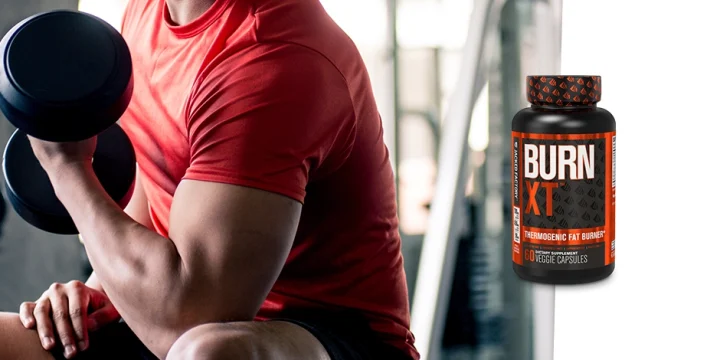The majority of my patients will always ask the question if there are any supplements that we recommend to speed up and boost their fat loss efforts.
From my experience in medical practice, particularly in dealing weight management, I often encounter questions that lead to discussions about products like fat burning and L-carnitine supplements.
But before you just buy the first supplements you can find, let me show you what they do and when people should use them.
Quick Summary
- Fat burners and L-carnitine supplements are both popular for weight loss, but they work through different mechanisms in the body.
- While fat burners often contain a mix of ingredients to stimulate metabolism, L-carnitine focuses on transporting fatty acids into cells for energy production.
- A pivotal study by the National Institutes of Health has shown that L-carnitine supplementation can significantly aid in weight loss, underscoring its effectiveness as a weight loss supplement.
- Personally, I believe a balanced approach combining diet, exercise, and supplements, if necessary, is the most effective strategy for weight loss.
What Are L-Carnitine Supplements?

L-carnitine supplements usually come in powder or capsule form, and they are designed as a dietary supplementation to support the natural L-carnitine production in your body.
I found them particularly helpful during my intense training periods. The way it works is as a transporter of fatty acids to the individual cells in your body.
Any L-carnitine deficiency can reduce the amount of fatty acids available for energy production in the mitochondria of muscle cells and to support brain health.
A pivotal study by the National Institutes of Health (NIH) has shown that boosts of this amino acid may help your body burn away love handles, making it a suitable weight loss supplement [1].
“L-carnitine is a chemical similar to an amino acid that is produced in the body. The body can convert L-carnitine to other chemicals called acetyl-Lcarnitine and propionyl-Lcarnitine.”
- WebMD.com
You can increase your L-carnitine intake through animal products like meat and dairy. But to help with weight loss goals, it may work better to get consistent boosts from supplements.
Here are the three most common forms you’ll find on a supplement label:
- Acetyl L-carnitine
- Propionyl L-carnitine
- Carnitine L-tartrate
It’s also important to note that you don’t confuse L-carnitine with CLA (conjugated linoleic acid), which is an entirely different supplement but often mistaken.
Post you may like: Is Carnitine Good For Weight Loss?
What Are Fat Burners?

Fat burners are supplements that combine stimulating and non-stimulating ingredients to support your metabolism and trigger natural burning processes.
According to a 2017 article published in ScienceDirect, in most cases, this involves triggering thermogenesis, which is a process your body uses to slightly raise your core temperature by burning off excess body fat reserves [2].
These supplements often include ingredients like green tea extract, caffeine, forskolin, Yohimbe, and glucomannan, but the formulas can vary a lot in strength. It’s important to note that these are not designed as a magic weight loss pill.
However, when incorporated into a healthy lifestyle including a balanced diet and regular exercise, they can aid in weight loss, body weight management, and the effective burning fat. By supporting your efforts, fat burners may help you achieve your desired results faster.
You’ll also find that some fat-burning products contain L-carnitine, allowing you to get an energy boost along with the fat-burning benefits. Let’s take a closer look.
Fat burners we recommend trying:
3 Main Differences

Like I’ve done in other comparison blog posts, I broke this section down into three parts.
1. Benefits
Fat-burning supplements provide a way for folks to:
- Support natural metabolic processes
- Lose weight
Performance athletes and bodybuilders also often use them to support the cutting phases of their training plans.
And there is evidence to support their use for mental stamina through stimulants like caffeine, which can have a positive effect on motivation.
The benefits of L-carnitine, on the other hand, include:
- Increased energy production for your muscles and brain
- Reduced muscle soreness after exercising
Remember though that it’s not a replacement for a muscle recovery protein shake but rather an extra boost.
The energy release may also help stamina during exercise, which could help build up more muscle mass in the long-term.
2. Side Effects

One of the main side effects of fat-burning supplements is that they often function as stimulants on the brain as well.
It’s like having a shot of strong espresso. This could make you feel jittery and struggle with getting enough refreshing sleep. That’s why it’s important to get the timing right for these supplements to work at their best.
L-carnitine is generally deemed to be safe for general use by the Food and Drug Administration, and most folks won’t suffer a side effect from a dose up to 2 grams per day.
However, if you have any underlying stomach health conditions or sensitivities, then beware that it may cause some nausea.
3. Suitability And Timing
Because of the limited negative effects of a fat burner and L-carnitine supplement, these are generally suitable for the majority of athletes.
As long as you get your expectations in place and understand that they support a healthy diet and workout routine, then it mainly becomes a question of the best timing.
Based on what worked for me, I'd suggest taking the recommended dose of your chosen product and spreading it out throughout the day. This approach helped me maintain steady energy levels and avoid any jitters.
Just avoid taking fat burners too late in the day, as the common stimulants could mess up your sleep.
Choosing For Your Personal Needs

The first thing I would say is that these energy and burner supplements are not suitable all the time. Both men and women have to fix their diet first and then consider how they structure a workout routine.
You should only consider a supplement when that combination is properly in place. And here’s what you should use to decide.
1. Bodybuilding
The example I’ll use here is a bodybuilder going through a bulking phase where they are on a calorie surplus diet to support the high-intensity weight lifting.
The main goal here is to build up as much muscle as possible in a short space of time. But the increased food intake will also result in a buildup of fat cells.
On the one hand, you could argue that fat-burning supplements might help to control how much your BMI increases.
Personally, my recommendation is to not mix bulking and cutting efforts. However, L-carnitine is a suitable option from a nutrition perspective as it may provide better stamina and less soreness after training.
2. Weight Loss And Cutting

Once a bodybuilder has bulked up over several weeks, there’s a need to remain in control of body composition. And that’s where fat burners seem to provide a helping hand.
While you’re going through a calorie deficit as part of your diet, your body will naturally burn fat. But you don’t want to spend more time in a cutting phase than you have to.
Also Read: Best Nighttime Fat Burners
That’s where a burner supplement comes into play, as even a single percent drop in BSI could make a difference.
3. Daily Work Activities
Our team’s experiences with both of these products have been positive for daily work and life activities. Not only from a general health benefits perspective, but we have noticed that we feel more energized.
Part of that will come from mental stimulation through ingredients like caffeine, but we’ve had similar results with non-stimulating products.
However, I would suggest that you avoid taking them every day, as you can become used to the effects and not trigger a positive response.
Related Post: Stimulant vs. Non-Stimulant Fat Burners: Which is Better for Weight Loss?
Fat Metabolizers vs Fat Burners
Fat burners primarily aim to reduce body fat and offer additional benefits like improving body condition, reducing waist circumference, suppressing appetite, and boosting energy levels for better workouts.
They come in various types with different ingredients, requiring careful selection and regular usage over several weeks to observe changes.
On the other hand, fat metabolizers alter the body's fat-processing mechanism, enhancing the breakdown and absorption of fat and its conversion into energy. These supplements vary in quality and often contain ingredients like carnitine or CLA, which are naturally used by the body.
Some fat metabolizers also include fat burners for increased effectiveness.
FAQs
Does L-carnitine burn belly fat?
Yes, L-carnitine may burn belly fat, but in a limited way. It plays a more critical role in delivering fatty acids for use in cell mitochondria. That means an increased supply could reduce the risk of a bottleneck for flabby stuff being burned away.
Can You Take L-Carnitine on an Empty Stomach?
Yes, you can take L-carnitine on an empty stomach, and nutritionists often recommend it.
The reason is that your body will absorb and process the amino acids a lot quicker. Just keep an eye on symptoms of nausea which are rare in both men and women.
References:
- https://pubmed.ncbi.nlm.nih.gov/27335245/
- https://www.sciencedirect.com/topics/agricultural-and-biological-sciences/thermogenesis
About The Author
You May Also Like






